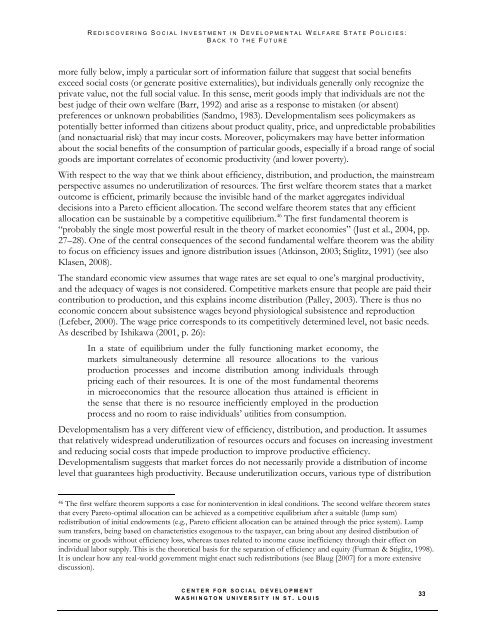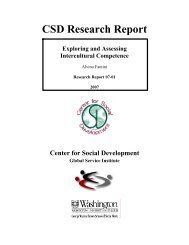Rediscovering social investment in developmental welfare state ...
Rediscovering social investment in developmental welfare state ...
Rediscovering social investment in developmental welfare state ...
Create successful ePaper yourself
Turn your PDF publications into a flip-book with our unique Google optimized e-Paper software.
R E D I S C O V E R I N G S O C I A L I N V E S T M E N T I N D E V E L O P M E N T A L W E L F A R E S T A T E P O L I C I E S :<br />
B A C K T O T H E F U T U R E<br />
more fully below, imply a particular sort of <strong>in</strong>formation failure that suggest that <strong>social</strong> benefits<br />
exceed <strong>social</strong> costs (or generate positive externalities), but <strong>in</strong>dividuals generally only recognize the<br />
private value, not the full <strong>social</strong> value. In this sense, merit goods imply that <strong>in</strong>dividuals are not the<br />
best judge of their own <strong>welfare</strong> (Barr, 1992) and arise as a response to mistaken (or absent)<br />
preferences or unknown probabilities (Sandmo, 1983). Developmentalism sees policymakers as<br />
potentially better <strong>in</strong>formed than citizens about product quality, price, and unpredictable probabilities<br />
(and nonactuarial risk) that may <strong>in</strong>cur costs. Moreover, policymakers may have better <strong>in</strong>formation<br />
about the <strong>social</strong> benefits of the consumption of particular goods, especially if a broad range of <strong>social</strong><br />
goods are important correlates of economic productivity (and lower poverty).<br />
With respect to the way that we th<strong>in</strong>k about efficiency, distribution, and production, the ma<strong>in</strong>stream<br />
perspective assumes no underutilization of resources. The first <strong>welfare</strong> theorem <strong>state</strong>s that a market<br />
outcome is efficient, primarily because the <strong>in</strong>visible hand of the market aggregates <strong>in</strong>dividual<br />
decisions <strong>in</strong>to a Pareto efficient allocation. The second <strong>welfare</strong> theorem <strong>state</strong>s that any efficient<br />
allocation can be susta<strong>in</strong>able by a competitive equilibrium. 46 The first fundamental theorem is<br />
―probably the s<strong>in</strong>gle most powerful result <strong>in</strong> the theory of market economies‖ (Just et al., 2004, pp.<br />
27–28). One of the central consequences of the second fundamental <strong>welfare</strong> theorem was the ability<br />
to focus on efficiency issues and ignore distribution issues (Atk<strong>in</strong>son, 2003; Stiglitz, 1991) (see also<br />
Klasen, 2008).<br />
The standard economic view assumes that wage rates are set equal to one‘s marg<strong>in</strong>al productivity,<br />
and the adequacy of wages is not considered. Competitive markets ensure that people are paid their<br />
contribution to production, and this expla<strong>in</strong>s <strong>in</strong>come distribution (Palley, 2003). There is thus no<br />
economic concern about subsistence wages beyond physiological subsistence and reproduction<br />
(Lefeber, 2000). The wage price corresponds to its competitively determ<strong>in</strong>ed level, not basic needs.<br />
As described by Ishikawa (2001, p. 26):<br />
In a <strong>state</strong> of equilibrium under the fully function<strong>in</strong>g market economy, the<br />
markets simultaneously determ<strong>in</strong>e all resource allocations to the various<br />
production processes and <strong>in</strong>come distribution among <strong>in</strong>dividuals through<br />
pric<strong>in</strong>g each of their resources. It is one of the most fundamental theorems<br />
<strong>in</strong> microeconomics that the resource allocation thus atta<strong>in</strong>ed is efficient <strong>in</strong><br />
the sense that there is no resource <strong>in</strong>efficiently employed <strong>in</strong> the production<br />
process and no room to raise <strong>in</strong>dividuals‘ utilities from consumption.<br />
Developmentalism has a very different view of efficiency, distribution, and production. It assumes<br />
that relatively widespread underutilization of resources occurs and focuses on <strong>in</strong>creas<strong>in</strong>g <strong><strong>in</strong>vestment</strong><br />
and reduc<strong>in</strong>g <strong>social</strong> costs that impede production to improve productive efficiency.<br />
Developmentalism suggests that market forces do not necessarily provide a distribution of <strong>in</strong>come<br />
level that guarantees high productivity. Because underutilization occurs, various type of distribution<br />
46 The first <strong>welfare</strong> theorem supports a case for non<strong>in</strong>tervention <strong>in</strong> ideal conditions. The second <strong>welfare</strong> theorem <strong>state</strong>s<br />
that every Pareto-optimal allocation can be achieved as a competitive equilibrium after a suitable (lump sum)<br />
redistribution of <strong>in</strong>itial endowments (e.g., Pareto efficient allocation can be atta<strong>in</strong>ed through the price system). Lump<br />
sum transfers, be<strong>in</strong>g based on characteristics exogenous to the taxpayer, can br<strong>in</strong>g about any desired distribution of<br />
<strong>in</strong>come or goods without efficiency loss, whereas taxes related to <strong>in</strong>come cause <strong>in</strong>efficiency through their effect on<br />
<strong>in</strong>dividual labor supply. This is the theoretical basis for the separation of efficiency and equity (Furman & Stiglitz, 1998).<br />
It is unclear how any real-world government might enact such redistributions (see Blaug [2007] for a more extensive<br />
discussion).<br />
C E N T E R F O R S O C I A L D E V E L O P M E N T<br />
W A S H I N G T O N U N I V E R S I T Y I N S T . L O U I S<br />
33
















